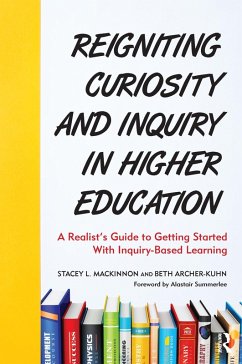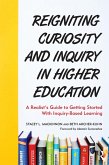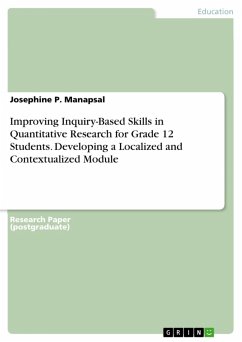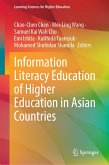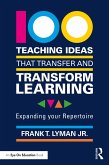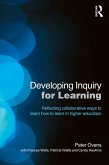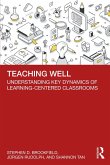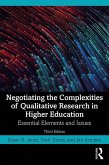Stacey L. MacKinnon, Beth Archer-Kuhn
Reigniting Curiosity and Inquiry in Higher Education (eBook, PDF)
A Realist's Guide to Getting Started with Inquiry-Based Learning
33,95 €
33,95 €
inkl. MwSt.
Sofort per Download lieferbar

17 °P sammeln
33,95 €
Als Download kaufen

33,95 €
inkl. MwSt.
Sofort per Download lieferbar

17 °P sammeln
Jetzt verschenken
Alle Infos zum eBook verschenken
33,95 €
inkl. MwSt.
Sofort per Download lieferbar
Alle Infos zum eBook verschenken

17 °P sammeln
Stacey L. MacKinnon, Beth Archer-Kuhn
Reigniting Curiosity and Inquiry in Higher Education (eBook, PDF)
A Realist's Guide to Getting Started with Inquiry-Based Learning
- Format: PDF
- Merkliste
- Auf die Merkliste
- Bewerten Bewerten
- Teilen
- Produkt teilen
- Produkterinnerung
- Produkterinnerung

Bitte loggen Sie sich zunächst in Ihr Kundenkonto ein oder registrieren Sie sich bei
bücher.de, um das eBook-Abo tolino select nutzen zu können.
Hier können Sie sich einloggen
Hier können Sie sich einloggen
Sie sind bereits eingeloggt. Klicken Sie auf 2. tolino select Abo, um fortzufahren.

Bitte loggen Sie sich zunächst in Ihr Kundenkonto ein oder registrieren Sie sich bei bücher.de, um das eBook-Abo tolino select nutzen zu können.
This book offers higher education instructors at any career stage and in any discipline, a realistic guide to incorporating curiosity and inquiry-based learning into their classrooms to promote long term knowledge creation and retention and life-wide learning.
- Geräte: PC
- ohne Kopierschutz
- eBook Hilfe
- Größe: 11.77MB
Andere Kunden interessierten sich auch für
![Reigniting Curiosity and Inquiry in Higher Education (eBook, ePUB) Reigniting Curiosity and Inquiry in Higher Education (eBook, ePUB)]() Stacey L. MacKinnonReigniting Curiosity and Inquiry in Higher Education (eBook, ePUB)33,95 €
Stacey L. MacKinnonReigniting Curiosity and Inquiry in Higher Education (eBook, ePUB)33,95 €![Improving Inquiry-Based Skills in Quantitative Research for Grade 12 Students. Developing a Localized and Contextualized Module (eBook, PDF) Improving Inquiry-Based Skills in Quantitative Research for Grade 12 Students. Developing a Localized and Contextualized Module (eBook, PDF)]() Josephine P. ManapsalImproving Inquiry-Based Skills in Quantitative Research for Grade 12 Students. Developing a Localized and Contextualized Module (eBook, PDF)6,99 €
Josephine P. ManapsalImproving Inquiry-Based Skills in Quantitative Research for Grade 12 Students. Developing a Localized and Contextualized Module (eBook, PDF)6,99 €![Information Literacy Education of Higher Education in Asian Countries (eBook, PDF) Information Literacy Education of Higher Education in Asian Countries (eBook, PDF)]() Information Literacy Education of Higher Education in Asian Countries (eBook, PDF)113,95 €
Information Literacy Education of Higher Education in Asian Countries (eBook, PDF)113,95 €![100 Teaching Ideas that Transfer and Transform Learning (eBook, PDF) 100 Teaching Ideas that Transfer and Transform Learning (eBook, PDF)]() Frank T. Lyman Jr.100 Teaching Ideas that Transfer and Transform Learning (eBook, PDF)30,95 €
Frank T. Lyman Jr.100 Teaching Ideas that Transfer and Transform Learning (eBook, PDF)30,95 €![Developing Inquiry for Learning (eBook, PDF) Developing Inquiry for Learning (eBook, PDF)]() Peter OvensDeveloping Inquiry for Learning (eBook, PDF)38,95 €
Peter OvensDeveloping Inquiry for Learning (eBook, PDF)38,95 €![Teaching Well (eBook, PDF) Teaching Well (eBook, PDF)]() Stephen D. BrookfieldTeaching Well (eBook, PDF)35,95 €
Stephen D. BrookfieldTeaching Well (eBook, PDF)35,95 €![Negotiating the Complexities of Qualitative Research in Higher Education (eBook, PDF) Negotiating the Complexities of Qualitative Research in Higher Education (eBook, PDF)]() Susan R. JonesNegotiating the Complexities of Qualitative Research in Higher Education (eBook, PDF)44,95 €
Susan R. JonesNegotiating the Complexities of Qualitative Research in Higher Education (eBook, PDF)44,95 €-
-
-
This book offers higher education instructors at any career stage and in any discipline, a realistic guide to incorporating curiosity and inquiry-based learning into their classrooms to promote long term knowledge creation and retention and life-wide learning.
Dieser Download kann aus rechtlichen Gründen nur mit Rechnungsadresse in A, B, BG, CY, CZ, D, DK, EW, E, FIN, F, GR, HR, H, IRL, I, LT, L, LR, M, NL, PL, P, R, S, SLO, SK ausgeliefert werden.
Produktdetails
- Produktdetails
- Verlag: Taylor & Francis eBooks
- Seitenzahl: 304
- Erscheinungstermin: 3. Juli 2023
- Englisch
- ISBN-13: 9781000975062
- Artikelnr.: 68356731
- Verlag: Taylor & Francis eBooks
- Seitenzahl: 304
- Erscheinungstermin: 3. Juli 2023
- Englisch
- ISBN-13: 9781000975062
- Artikelnr.: 68356731
- Herstellerkennzeichnung Die Herstellerinformationen sind derzeit nicht verfügbar.
Stacey L. MacKinnon is an associate professor with the Department of Psychology at the University of Prince Edward Island. Stacey has spent the last 12 years designing and implementing The Curiosity Project and the past six years developing and coordinating UPEI 1020 First Year Inquiry Studies. She is the recipient of the 2012 Hessian Award for Excellence in Teaching, 2012 President's Award of Merit for Teaching, 2016 UPEI Professor of the Year, and the 2022 Janet Pottie Murray Award for Excellence in Education Leadership. As a lifelong and life-wide learner herself, Stacey strives to inspire her students and colleagues to fully engage their curiosity mindset and inquiry skills to explore all the possibilities our world has to offer. She is currently developing a new approach to reading non-fiction that incorporates active inquiry to improve students' ability and willingness to engage in deeper critical understanding, academic discussion and the quality of both their informal and formal writing. She strongly believes that learning should be both enjoyable and challenging for both the students and professor. By harnessing our curiosity or "desire to inquire", much can be done to achieve that goal. Beth Archer-Kuhn is an associate professor with the Faculty of Social Work at the University of Calgary. As a Teaching and Learning Scholar (Taylor Institute for Teaching and Learning) and recipient of the Teaching Excellence Award (Faculty of Social Work), Beth has spent the last ten years learning about IBL-HE through implementation and SoTL research with undergraduate, graduate and doctoral students within courses on-campus, study abroad, and on-line. She believes IBL-HE is a socially just and inclusive pedagogy that aligns with the values of social work education, can support students with varied learning preferences, and allows students the necessary choice and agency to inspire lifelong learners.
Foreword-Alastair Summerlee Acknowledgments Introduction Part I. The
Fundamental Principles of IBL and Adopting a Curiosity Mindset 1. The
Fundamental Principles of Inquiry-Based Learning 2. Developing a
Curiosity-Based Mindset and Reimagining the Roles of Instructor and Student
in IBL-HE Part II. How Do I Determine Where to Start with My IBL-HE
Practice? 3. Should I Start from Scratch or Adapt What I Already Have? 4.
How Much IBL and How Much Structure Should I Include When Getting Started?
5. What Are My Options for Assessing Learning in IBL-HE? Part III. How Do I
Get My Students Started with IBL-HE? 6. How Do I Encourage Students to
Participate and Ask Good Questions? 7. How Do My Students and I Choose
Research Methods in IBL-HE? 8. I Know Reflection is Important but What Do I
Ask Students to Reflect On? 9. What Kind of Feedback Do Students Need From
Me and Each Other? Part IV. How Do We Build the Supportive Relationships
that Allow IBL-HE to Thrive? 10. How Do I Create a Trusting Classroom
Environment that Supports Interdependent Learning? 11. How Can I
Incorporate the Community in MY IBL-HE Practice? 12. How Do I Find
Mentoring and Build a Community of Practice? 13. What Kind of Institutional
Support Do I Need to be Successful at IBL-HE? Part V. What Does Successful
IBL-HE Look Like in the End? 14. Student Engagement and Pride in Learning
15. Adopting a Lifelong and Life-Wide Learning Mindset and Using Your
Inquiry Skills Beyond the Classroom 16. Academic and Personal
Transformation 17. Increased Social Justice Focus In and Out of the IBL-HE
Classroom Conclusion. The End of This Book is Just the Beginning Appendix
A. Structured Controversy Appendix B. The Curiosity Project Appendix C.
First Year Inquiry Studies Appendix D. IBL in Block Week and Group Study
Appendix E. Additional Resources References About the Authors Index
Fundamental Principles of IBL and Adopting a Curiosity Mindset 1. The
Fundamental Principles of Inquiry-Based Learning 2. Developing a
Curiosity-Based Mindset and Reimagining the Roles of Instructor and Student
in IBL-HE Part II. How Do I Determine Where to Start with My IBL-HE
Practice? 3. Should I Start from Scratch or Adapt What I Already Have? 4.
How Much IBL and How Much Structure Should I Include When Getting Started?
5. What Are My Options for Assessing Learning in IBL-HE? Part III. How Do I
Get My Students Started with IBL-HE? 6. How Do I Encourage Students to
Participate and Ask Good Questions? 7. How Do My Students and I Choose
Research Methods in IBL-HE? 8. I Know Reflection is Important but What Do I
Ask Students to Reflect On? 9. What Kind of Feedback Do Students Need From
Me and Each Other? Part IV. How Do We Build the Supportive Relationships
that Allow IBL-HE to Thrive? 10. How Do I Create a Trusting Classroom
Environment that Supports Interdependent Learning? 11. How Can I
Incorporate the Community in MY IBL-HE Practice? 12. How Do I Find
Mentoring and Build a Community of Practice? 13. What Kind of Institutional
Support Do I Need to be Successful at IBL-HE? Part V. What Does Successful
IBL-HE Look Like in the End? 14. Student Engagement and Pride in Learning
15. Adopting a Lifelong and Life-Wide Learning Mindset and Using Your
Inquiry Skills Beyond the Classroom 16. Academic and Personal
Transformation 17. Increased Social Justice Focus In and Out of the IBL-HE
Classroom Conclusion. The End of This Book is Just the Beginning Appendix
A. Structured Controversy Appendix B. The Curiosity Project Appendix C.
First Year Inquiry Studies Appendix D. IBL in Block Week and Group Study
Appendix E. Additional Resources References About the Authors Index
Foreword-Alastair Summerlee Acknowledgments Introduction Part I. The Fundamental Principles of IBL and Adopting a Curiosity Mindset 1. The Fundamental Principles of Inquiry-Based Learning 2. Developing a Curiosity-Based Mindset and Reimagining the Roles of Instructor and Student in IBL-HE Part II. How Do I Determine Where to Start with My IBL-HE Practice? 3. Should I Start from Scratch or Adapt What I Already Have? 4. How Much IBL and How Much Structure Should I Include When Getting Started? 5. What Are My Options for Assessing Learning in IBL-HE? Part III. How Do I Get My Students Started with IBL-HE? 6. How Do I Encourage Students to Participate and Ask Good Questions? 7. How Do My Students and I Choose Research Methods in IBL-HE? 8. I Know Reflection is Important but What Do I Ask Students to Reflect On? 9. What Kind of Feedback Do Students Need From Me and Each Other? Part IV. How Do We Build the Supportive Relationships that Allow IBL-HE to Thrive? 10. How Do I Create a Trusting Classroom Environment that Supports Interdependent Learning? 11. How Can I Incorporate the Community in MY IBL-HE Practice? 12. How Do I Find Mentoring and Build a Community of Practice? 13. What Kind of Institutional Support Do I Need to be Successful at IBL-HE? Part V. What Does Successful IBL-HE Look Like in the End? 14. Student Engagement and Pride in Learning 15. Adopting a Lifelong and Life-Wide Learning Mindset and Using Your Inquiry Skills Beyond the Classroom 16. Academic and Personal Transformation 17. Increased Social Justice Focus In and Out of the IBL-HE Classroom Conclusion. The End of This Book is Just the Beginning Appendix A. Structured Controversy Appendix B. The Curiosity Project Appendix C. First Year Inquiry Studies Appendix D. IBL in Block Week and Group Study Appendix E. Additional Resources References About the Authors Index
Foreword-Alastair Summerlee Acknowledgments Introduction Part I. The
Fundamental Principles of IBL and Adopting a Curiosity Mindset 1. The
Fundamental Principles of Inquiry-Based Learning 2. Developing a
Curiosity-Based Mindset and Reimagining the Roles of Instructor and Student
in IBL-HE Part II. How Do I Determine Where to Start with My IBL-HE
Practice? 3. Should I Start from Scratch or Adapt What I Already Have? 4.
How Much IBL and How Much Structure Should I Include When Getting Started?
5. What Are My Options for Assessing Learning in IBL-HE? Part III. How Do I
Get My Students Started with IBL-HE? 6. How Do I Encourage Students to
Participate and Ask Good Questions? 7. How Do My Students and I Choose
Research Methods in IBL-HE? 8. I Know Reflection is Important but What Do I
Ask Students to Reflect On? 9. What Kind of Feedback Do Students Need From
Me and Each Other? Part IV. How Do We Build the Supportive Relationships
that Allow IBL-HE to Thrive? 10. How Do I Create a Trusting Classroom
Environment that Supports Interdependent Learning? 11. How Can I
Incorporate the Community in MY IBL-HE Practice? 12. How Do I Find
Mentoring and Build a Community of Practice? 13. What Kind of Institutional
Support Do I Need to be Successful at IBL-HE? Part V. What Does Successful
IBL-HE Look Like in the End? 14. Student Engagement and Pride in Learning
15. Adopting a Lifelong and Life-Wide Learning Mindset and Using Your
Inquiry Skills Beyond the Classroom 16. Academic and Personal
Transformation 17. Increased Social Justice Focus In and Out of the IBL-HE
Classroom Conclusion. The End of This Book is Just the Beginning Appendix
A. Structured Controversy Appendix B. The Curiosity Project Appendix C.
First Year Inquiry Studies Appendix D. IBL in Block Week and Group Study
Appendix E. Additional Resources References About the Authors Index
Fundamental Principles of IBL and Adopting a Curiosity Mindset 1. The
Fundamental Principles of Inquiry-Based Learning 2. Developing a
Curiosity-Based Mindset and Reimagining the Roles of Instructor and Student
in IBL-HE Part II. How Do I Determine Where to Start with My IBL-HE
Practice? 3. Should I Start from Scratch or Adapt What I Already Have? 4.
How Much IBL and How Much Structure Should I Include When Getting Started?
5. What Are My Options for Assessing Learning in IBL-HE? Part III. How Do I
Get My Students Started with IBL-HE? 6. How Do I Encourage Students to
Participate and Ask Good Questions? 7. How Do My Students and I Choose
Research Methods in IBL-HE? 8. I Know Reflection is Important but What Do I
Ask Students to Reflect On? 9. What Kind of Feedback Do Students Need From
Me and Each Other? Part IV. How Do We Build the Supportive Relationships
that Allow IBL-HE to Thrive? 10. How Do I Create a Trusting Classroom
Environment that Supports Interdependent Learning? 11. How Can I
Incorporate the Community in MY IBL-HE Practice? 12. How Do I Find
Mentoring and Build a Community of Practice? 13. What Kind of Institutional
Support Do I Need to be Successful at IBL-HE? Part V. What Does Successful
IBL-HE Look Like in the End? 14. Student Engagement and Pride in Learning
15. Adopting a Lifelong and Life-Wide Learning Mindset and Using Your
Inquiry Skills Beyond the Classroom 16. Academic and Personal
Transformation 17. Increased Social Justice Focus In and Out of the IBL-HE
Classroom Conclusion. The End of This Book is Just the Beginning Appendix
A. Structured Controversy Appendix B. The Curiosity Project Appendix C.
First Year Inquiry Studies Appendix D. IBL in Block Week and Group Study
Appendix E. Additional Resources References About the Authors Index
Foreword-Alastair Summerlee Acknowledgments Introduction Part I. The Fundamental Principles of IBL and Adopting a Curiosity Mindset 1. The Fundamental Principles of Inquiry-Based Learning 2. Developing a Curiosity-Based Mindset and Reimagining the Roles of Instructor and Student in IBL-HE Part II. How Do I Determine Where to Start with My IBL-HE Practice? 3. Should I Start from Scratch or Adapt What I Already Have? 4. How Much IBL and How Much Structure Should I Include When Getting Started? 5. What Are My Options for Assessing Learning in IBL-HE? Part III. How Do I Get My Students Started with IBL-HE? 6. How Do I Encourage Students to Participate and Ask Good Questions? 7. How Do My Students and I Choose Research Methods in IBL-HE? 8. I Know Reflection is Important but What Do I Ask Students to Reflect On? 9. What Kind of Feedback Do Students Need From Me and Each Other? Part IV. How Do We Build the Supportive Relationships that Allow IBL-HE to Thrive? 10. How Do I Create a Trusting Classroom Environment that Supports Interdependent Learning? 11. How Can I Incorporate the Community in MY IBL-HE Practice? 12. How Do I Find Mentoring and Build a Community of Practice? 13. What Kind of Institutional Support Do I Need to be Successful at IBL-HE? Part V. What Does Successful IBL-HE Look Like in the End? 14. Student Engagement and Pride in Learning 15. Adopting a Lifelong and Life-Wide Learning Mindset and Using Your Inquiry Skills Beyond the Classroom 16. Academic and Personal Transformation 17. Increased Social Justice Focus In and Out of the IBL-HE Classroom Conclusion. The End of This Book is Just the Beginning Appendix A. Structured Controversy Appendix B. The Curiosity Project Appendix C. First Year Inquiry Studies Appendix D. IBL in Block Week and Group Study Appendix E. Additional Resources References About the Authors Index
"This book is timely and prescient. It provides a hands-on, practical guide to evolutionary changes in methods of pedagogy that can be used by individual instructors and faculty or taken in larger chunks to change the approaches to teaching and learning across courses and programs in higher education. It will be a valuable asset to teachers and learners alike.
Employers, students and parents are demanding change like never before. The advent of social media, ubiquitously available information through the internet, the rapidly changing pace of societal change through continued automation, and the pandemic require seismic shifts in ways of thinking and working. Inquiry-based learning (IBL) is a vital tool in making that adaption."
From the Foreword by Alastair Summerlee, former president and vice-chancellor of Guelph University; professor in biomedical sciences
Employers, students and parents are demanding change like never before. The advent of social media, ubiquitously available information through the internet, the rapidly changing pace of societal change through continued automation, and the pandemic require seismic shifts in ways of thinking and working. Inquiry-based learning (IBL) is a vital tool in making that adaption."
From the Foreword by Alastair Summerlee, former president and vice-chancellor of Guelph University; professor in biomedical sciences
